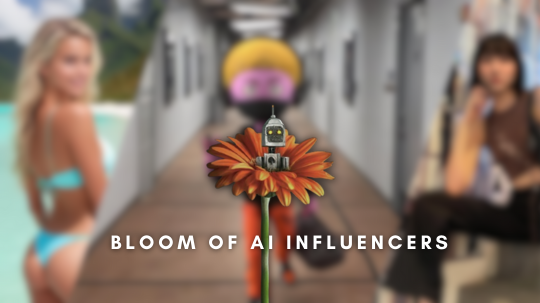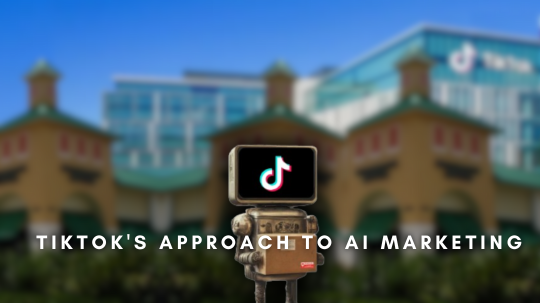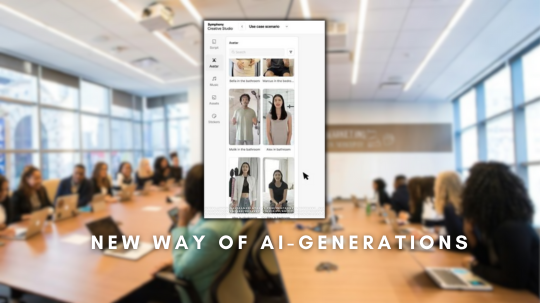
The Rise of TikTok’s New Influencers

You're probably wondering, "How can I use AI with my TikTok business?"
TikTok has grown widely accepted all over the world for creating short videos and for social media usage. It has also manifested in e-business, especially concerning the market fashion trends and consumers’ buying behaviors. Now, TikTok is extending this concept to full-blown AI avatars, also known as artificial intelligence-generated influencers or Aigs. These influencers are similar to human influencers but the are always ‘awake’ always without having to rest or take a nap.
The use of using Artificial-intelligence generated influencers on the TikTok platform is a major revolutionary change in social commerce. It is therefore satisfactory that the brands may use these personas to advance the marketing techniques to reach out to more audiences and broadcast timely customized content. Thus, this evolution seems to provide greater efficiencies in the area of Influencer marketing but concerns around authenticity and trust with consumers remain. With the development of AI technology, the number of influencer accounts that belong to the AI category in TikTok will also increase and they will dictate how brands interact with consumers in the digital scenario.
The Bloom AI-Generated Influencers

AI-originated influencers are computer-generated individuals who have been trained via Artificial Intelligence to effectively engage with the audience to market or advertise a product or service. While this kind of influence is attributed to human beings, the entities carrying out these influences do so 24/7/365 without any interruption.
AI-generated influencers can be vividly traced in the recent development in Artificial Intelligence in conjunction with deep learning and natural language processing. These help enhance the natural human-like actions and conversation skills of these AI influencers to market secure advertisements straight to the audiences.
Innovatively, AI influencers such as those seen on Douyin have become an innovative method of digital marketing. These computerized personalities have proved popular in getting the attention of target markets as well as perusing sales. For example, they can have a live stream where they can easily make sales, demonstrate, and take questions which gives consumers a human experience as they shop.
This new concept of AI-generated influencers represents a major change in the digital marketing sphere since they can be a less expensive and easily measurable solution for many companies compared to the current concept of influencer marketing. As far as prospects are concerned there is no doubt that with advancements in technology AI influencers are set to become a more and more significant factor in determining trends and trends shaping consumers’ choices in several different contexts.
TikTok's Approach to AI Influencer Marketing

TikTok now in two years became a leader in both – advertising and influencer marketing. While it has garnered billions of users and crawler effects, TikTok has also transformed the way brands interact with the audience through hundreds of millions of clips.
Just recently, TikTok has started to incorporate AI look-alikes as one of the elements of the influencer marketing strategy. Such virtual personalities are designed to entertain the viewers as orators and communicate with them as influentials. It is to increase brand awareness and effective brand communication to the target audience without compromising sequential posting.
There are some benefits of artificial intelligence-generated influencers over traditional influencer marketing on TikTok. They can work around the clock without feeling the effects of such activities, thus, being able to engage with audiences across the world continuously. Furthermore, AI influencers are also efficient means of marketing cost-effective and efficient means of marketing for brands that seek to expand their campaigns beyond the ability of human influencers.
Nevertheless, regular identities that are present in TikTok still possess significant influence, primarily because of the credibility they depict. The task here remains the identification of effective choices of AI-assisted influencer marketing together with human-driven influencer marketing; enhancing results of the application of influencers throughout different ranges of potential TikTok’s clientèle.
With TikTok growing from strength to strength, it is evident that its strategic decision to incorporate AI in its influencer marketing is strategic and innovative in driving technological solutions towards brand marketing in the current world.
The Changes for AI-Generated Influencers

TikTok has firmly cemented itself in the realm of pure play and influencer marketing via aspirational generated content, creating a new way in which brands can interact with consumers via short-form videos.
More recently, TikTok included AI-generated influencers in advertising and influencer marketing. The virtual personalities are designed to address the viewers in an application or in a human-like manner to increase the audience's attention to the brand and products on the platform.
When compared to classic influencer marketing on TikTok, AI-created influencers have pros of their own. They run 24/7 without interruptions constantly allowing interaction with the target market, and this enhances the scalability and productivity of the marketing campaigns. Further, it is seen that AI influencers cut down costs, which are otherwise incurred while engaging human influencers, and, in return, provide consumers with customized content based on their likes.
Nevertheless, the AI-generated influencers encounter various challenges on TikTok although; Among them, trust and authentic care remain critical issues with consumers. The biggest disadvantage, therefore, is that AI-created personas may not be able to gain trust and ‘friend’ customers as real-life influencers would. The risks of technical glitches and errors of artificial intelligence also affect communication issues and brand image in the perception of consumers. Moreover, the lack of well-defined regulation and ethical frameworks in AI-related marketing like data accessibility and transparency has remained an essential concern for brand managers.
Thus, using AI-created influencers may be a significant opportunity for brands to progress their sales on TikTok for marketers; however, the problem of the audience’s trust and technical features needs to be solved. The role and utilization of artificial intelligence in influencer marketing is a double-edged sword because while technology will be crucial for the future of this marketing strategy, it is the development of an authentic relationship between brands and consumers that will define success in this space on TikTok.
.
Conclusion
It seems that TikTok taking AI-based influencers is a risky approach within the sphere of digital marketing. Through the incorporation of virtual personalities underpinned by AI, TikTok shifted the way the brand interacts with its audiences. AI influencers function smoothly; they can provide constant interactiveness, focusing on a 24/7 presence, whereas human influencers have their biological limitations that change the faces of influencer marketing approaches. It enables brands to achieve more implementations and share relevant content, which consumers are interested in.
AI existence on TikTok seems quite encouraging but not without challenges in the future. As the AI machinery develops, it becomes logical to expect that virtual influencers will also become more complex and perform more elaborate tasks of interaction with the viewing audience. As advancements in natural language processing and machine learning continue, one can expect improvements to engagement by AI influencers as they seek to accurately connect with a wide range of TikTok users. Specular to the legal requirements, ethical and regulatory structures will need to adapt and respond to effectively address the potential for misuse and maintain consumer confidence. In conclusion, the progress of AI influencers on TikTok will determine new aspects of marketing improvement in social networks, and therefore it will have its pros and contras for branding communication with the customers.

